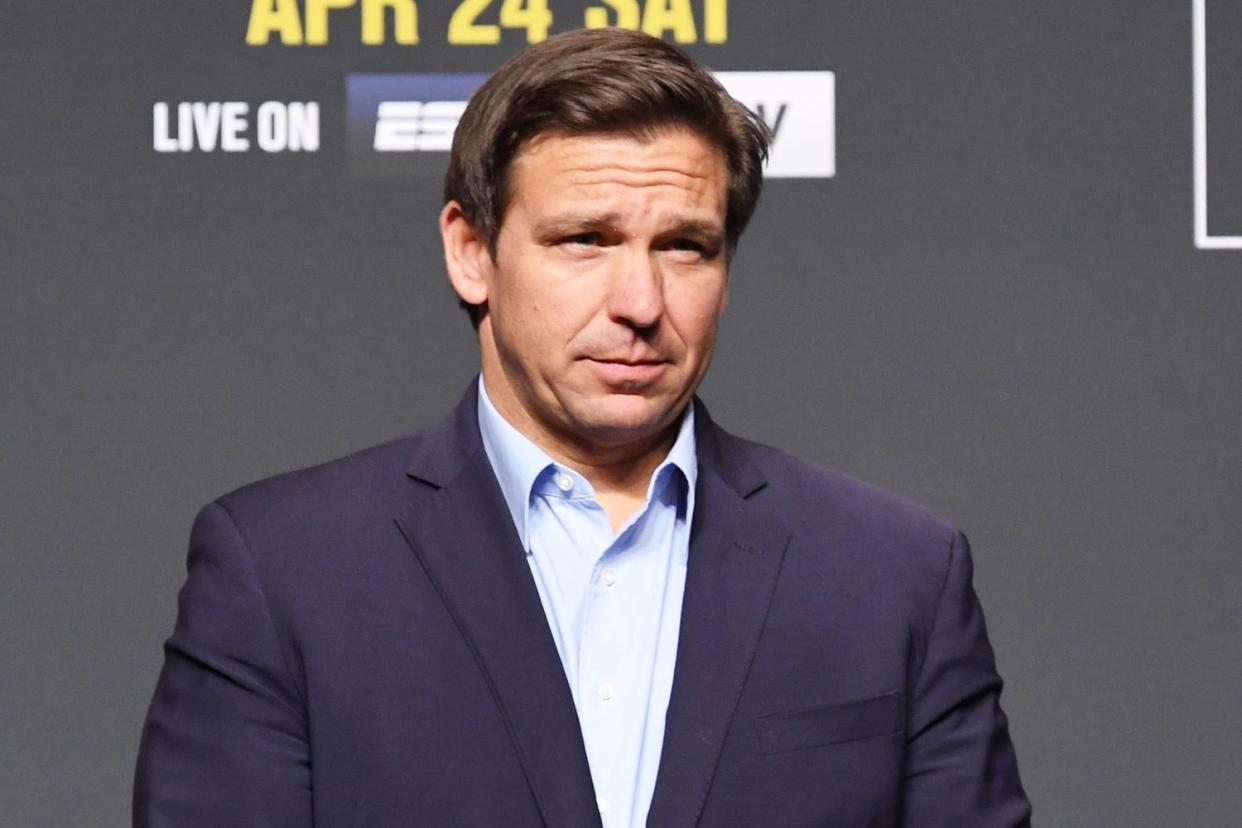Florida Governor Announces $1,000 Bonuses for First Responders and Signs Controversial Voting Law

Josh Hedges/Zuffa LLC/Getty Ron DeSantis
Florida Gov. Ron DeSantis is — again — receiving a mix of praise and criticism, both for announcing $1,000 bonuses for first responders and for signing into law a controversial elections bill and a measure critics say infringes on protestors.
The Republican made the announcement about the bonuses in a Wednesday press briefing at the Satellite Beach Police Department in Brevard County, in which he said his 2021 budget included $1,000 checks for every police officer, firefighter, paramedic and EMT in Florida.
Using the opportunity to make a dig at those progressive legislators who have called for a reduction in police budgets to address police misconduct, DeSantis said: "I thought it was important to recognize the service, to recognize the sacrifice, and I asked the legislature in this legislative session, we need to do bonuses for law enforcement. Some wanted to defund the police — we're funding the police, and then some."
More than $200 million will go toward the one-time payments, which mirror similar measures passed in other states and municipalities around the country in light of the COVID-19 pandemic.
Last year, New Hampshire announced that first responders would be eligible for weekly stipends up to $300 weekly during the pandemic while in Atlanta, the Fulton County Board of Commissioners approved $750 dollars in hazard pay for more than 1,800 frontline workers.
Hazard pay bonuses for frontline workers have been granted in a range of other cities across the country, as well.
DeSantis has also proposed $1,000 bonuses for public school principals and full-time classroom teachers due to the challenges of the pandemic.
The announcement of the bonuses coincided with another spate of headlines on Thursday, as DeSantis signed into law a voting bill that critics said would make it harder for people to cast ballots and disproportionately affect people of color and the elderly.
Among the provisions in the bill are stricter voter ID requirements for voting by mail and a two-ballot limit on how many mail-in ballots someone can turn in on behalf of an elderly or disabled voter (with an exception for immediate family voters).
The bill also restricts when drop boxes — which have been widely used during recent elections, due to the pandemic — can be used.
The legislation initially placed even more stringent measures on voting, including prohibiting the distribution of food and water to others near a polling place or drop box. But some of those provisions were edited or toned down following debate by lawmakers.
RELATED: Stacey Abrams Goes Viral with Her Criticisms of Georgia's New Elections Law
In a statement announcing his signing of the bill — which was unusually restricted from public view because it was airing on Fox News — DeSantis argued it would "increase transparency and strengthen the security of our elections," despite experts agreeing there is no widespread election fraud in America.
(Suggestions of election tampering have become more prominent among conservatives after former President Donald Trump refused to accept his defeat last year.)
"Floridians can rest assured that our state will remain a leader in ballot integrity," DeSantis said in a statement. "Elections should be free and fair, and these changes will ensure this continues to be the case in the Sunshine State."
"Me signing this bill says, 'Florida, your vote counts, your vote is going to be cast with integrity and transparency and this is a great place for democracy,' " DeSantis said after signing the bill Thursday morning, in an appearance on Fox News' Fox & Friends.
Within minutes of the signing, a coalition comprised of groups including the League of Women Voters of Florida and the Black Voters Matter Fund announced it had filed a lawsuit against the measure, which they contended was a form of voter suppression.
"The legislation has a deliberate and disproportionate impact on elderly voters, voters with disabilities, students and communities of color," Patricia Brigham, president of the League of Women Voters of Florida, said in a statement. "It's a despicable attempt by a one party ruled legislature to choose who can vote in our state and who cannot. It's undemocratic, unconstitutional, and un-American."
DeSantis' signing of the voting law came just weeks after he signed another bill mired in controversy, which critics say could infringe on the rights of protesters. Dubbed the "anti-riot bill" by the Republicans who led the measure, it was approved largely on party lines.
DeSantis, who faces no lack of scrutiny from Florida liberals, is a rising star among Republicans nationally and a rumored contender for president, or vice president, in 2024.
In an April interview with Fox Business host Maria Bartiromo, President Trump said the Florida governor would be considered as a potential running mate — were he to launch another bid for the presidency.
"He's a friend of mine. I endorsed Ron, and after I endorsed him, he took off like a rocket ship. He's done a great job as governor," Trump said.

